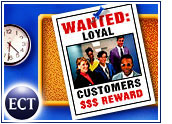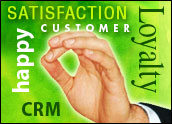
While American minds may be opening to various self-help pharmaceuticals, from Viagra for erectile dysfunction to Wellbutrin for depression, American feet aren’t equally comfortable walking the aisles of brick-and-mortar drugstores to get the goods, some studies show.
Enter Drugstore.com, a site launched in 1999. Not only does it offer privacy in personal prescription and over-the-counter pharmaceutical purchases, it also offers personalized weekly sales circulars, called Diamond Deals, that are refined with each visit a customer makes to Drugstore.com. The offers appear online when a customer logs in.
Analysts suggest that the young Web retailer is adjusting well to the latest marketing trends.
Not a Club
Diamond Deals adheres to a personalization algorithm to make these customized offers, Ramer Holtan, a general manager at Drugstore.com, told CRM Buyer. All site customers receive personalized Diamond Deals after their first orders. The offers take into account page views, time spent looking at particular products, products placed in shopping carts and those eventually purchased.
“There’s no club. There’s nothing to sign. It’s automatic,” said Holtan.
Drugstore.com provides this information to health and beauty aids and pharmaceutical manufacturers to promote their products in e-mail. Drawing from visitor records, Drugstore.com knows which manufacturer promotions to send to each customer.
All manufacturer specials are available to the entire database, “but we may not show them to everyone,” said Holtan, so as not to waste the time of customers whose category shopping habits are well known by the e-tailer. “Our primary concern is with our customer base and providing relevance.”
Avoiding Unsubscribers
“There have been lots of cases when we’ve been contacted by manufacturers who wanted us to send an e-mail and were willing to pay for it, and we said no because there was not enough interest in it” among his customer base, he explained.
“If customers respond to an e-mail by unsubscribing at a more-than-normal rate, that’s a big cost to us. That’s loss of customers,” said Holtan.
Relevancy also matters because Drugstore.com has committed to sending only a fixed number of e-mails to an individual customer over a year’s time. Every message has to promise a high conversion to sales, and every price must fall within the individual’s price-sensitivity threshold.
Not all of the promotions sent to Drugstore.com customers through e-mail or Diamond Deals are price discounts. As manufacturers get more involved in retail programs of all kinds, they willingly give up their interest in short-term gains like weekly sales in favor of longer-term returns such as customer satisfaction and increased brand equity.
Manufacturers deliver more information about their products as part of their new focus, Holtan said. “There is a lot of pre-sale advance information, pre-ordering and information on when product will be available to ship,” he said. “We had a very successful campaign with Crest White Strips.”
Content and Rewards
“The reality is there are two different kinds of family — quality-oriented and price-oriented. They coexist in any grocery or drugstore,” said Ed Logan, senior vice president of client services for Harte-Hanks Inc., located in Maryland. Quality oriented customers need content, he said, in addition to discounts.
“We are seeing less couponing,” he continued. “It’s now less expensive to provide content than rewards.”
Consumer packaged goods and pharmaceutical manufacturers, he said, are taking marketing dollars and shifting them to customer-specific and segment-specific programs.
Shift from Sunday Circulars
“Years ago, they just gave money for discounts. Now they’re beginning to shift not only discounts — giving rich discounts to the most relevant consumers — but they’re beginning to fund different channels, [not just] newspaper circulars,” he said.
They may lose the mass purchase activity they sought with free-standing inserts in Sunday papers, but their participation with channels like Drugstore.com enables them to direct behavior change among consumers most likely to buy their products.
“Two different things need to be contained from a benefits perspective: behavior motivators and behavior reinforcers,” he continued. One entices the consumer, the other rewards him or her for purchase activity already exhibited.










































